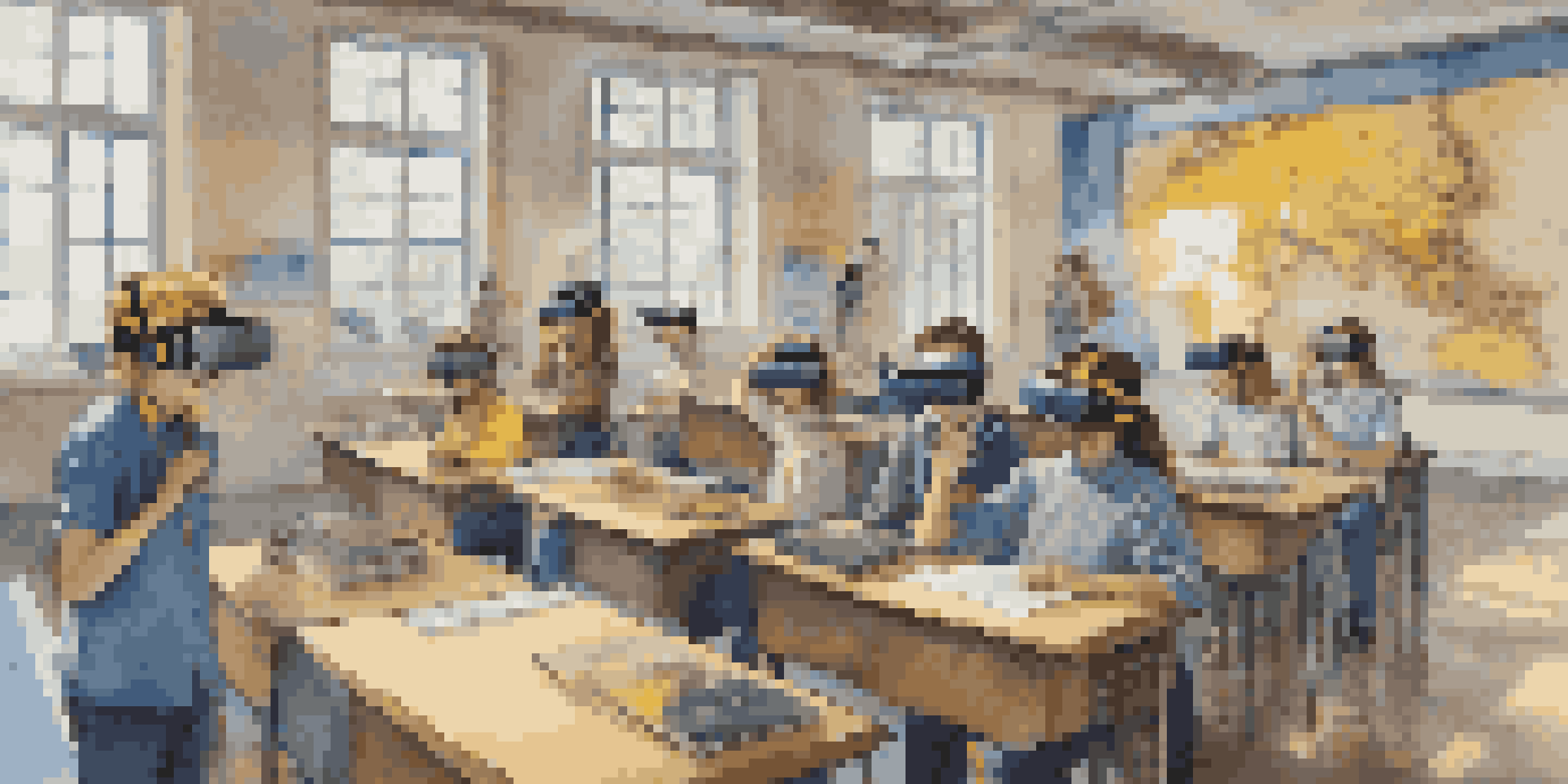The Role of VR in Fostering Empathy and Understanding

What is Virtual Reality and Its Growing Importance?
Virtual reality (VR) is an immersive technology that simulates real-life experiences through computer-generated environments. By using VR headsets, users can engage with these environments as though they were physically present. In recent years, VR has gained traction not just in gaming but also in various fields like education, therapy, and social activism.
Virtual reality is not just a technology; it's a means of bridging the gap between understanding and empathy.
The importance of VR in our increasingly digital world cannot be overstated. It offers unique opportunities to connect with others' experiences in ways that traditional media cannot. This capability is particularly valuable in fostering empathy and understanding among diverse populations.
As we navigate a world filled with differing perspectives, VR stands out as a tool that can help bridge gaps. By placing individuals in another person's shoes, VR can evoke emotions and insights that lead to greater compassion and awareness.
How VR Simulates Real-Life Experiences
One of the most powerful aspects of VR is its ability to create a sense of presence, making users feel as if they are truly part of the experience. For instance, a VR simulation might allow someone to experience life as a refugee, walking through challenges that others face daily. This immersive quality can make abstract concepts such as displacement or inequality feel very real and immediate.

Additionally, VR can engage multiple senses, further enhancing the emotional impact of the experience. By incorporating visuals, sounds, and even tactile feedback, users can become more attuned to the nuances of others' lives. This multi-sensory involvement can lead to a deeper understanding of complex social issues.
VR Enhances Empathy and Understanding
Virtual reality immerses users in experiences that foster empathy by allowing them to see the world through others' perspectives.
Through these simulations, individuals gain insight into experiences outside their own. This can spark conversations and reflections that might not occur in more conventional settings, emphasizing the transformative potential of VR.
VR in Education: Cultivating Compassionate Citizens
In educational settings, VR is being used to foster empathy among students. Imagine a classroom where students can step into the shoes of historical figures, experiencing significant events from their perspectives. This approach not only makes learning more engaging but also helps students connect emotionally with historical narratives.
Empathy is about finding echoes of another person in yourself.
Moreover, educators are utilizing VR to teach social and emotional learning (SEL) by simulating real-life dilemmas. Students can practice empathy by navigating scenarios that require understanding others' emotions and motivations. This experiential learning can prepare them for real-world interactions.
As students develop empathy through VR, they become more compassionate citizens. By understanding diverse perspectives, they are better equipped to engage in constructive dialogue and work towards solutions in a multicultural society.
Therapeutic Applications of VR for Empathy Building
VR is also making waves in the field of therapy, where it is used to help individuals build empathy and emotional resilience. Therapists can employ VR simulations to expose clients to situations that evoke anxiety or discomfort, all within a controlled environment. This exposure can help clients process their feelings and develop a greater understanding of their emotions.
In particular, VR has been successfully applied to address issues like PTSD and social anxiety. By allowing clients to confront their fears in a safe space, they can learn to navigate their emotions and responses. This therapeutic journey often leads to increased empathy for both themselves and others.
VR's Role in Education and Therapy
In educational settings and therapeutic practices, VR helps individuals develop emotional resilience and compassionate understanding through immersive simulations.
The capacity for VR to facilitate emotional healing and understanding is a testament to its potential in therapy. As clients explore their feelings through immersive experiences, they can cultivate a broader sense of empathy towards others who share similar struggles.
VR for Social Change: Influencing Perspectives
Nonprofits and social organizations are harnessing the power of VR to promote social change and raise awareness of critical issues. Through compelling storytelling, VR can immerse users in the realities faced by marginalized communities, making the experiences more relatable. This firsthand exposure can inspire action and advocacy in ways that traditional campaigns often struggle to achieve.
For instance, a VR experience might allow users to witness the daily challenges of those living in poverty, compelling them to reevaluate their perceptions and attitudes. By fostering empathy through these experiences, organizations can mobilize support and create a more inclusive society.
As VR continues to evolve, its role in social change will likely expand, providing innovative ways to engage people in meaningful conversations about empathy and understanding. This can lead to a more compassionate world, driven by shared experiences and mutual respect.
The Ethical Considerations of VR Experiences
While VR has significant potential for fostering empathy, ethical considerations must be addressed. For instance, it’s crucial to ensure that the experiences created do not exploit or misrepresent the communities they aim to portray. Developers and creators have a responsibility to approach these narratives with sensitivity and care, aiming to empower rather than exploit.
Moreover, the emotional impact of immersive experiences can be profound, sometimes leading to distress or discomfort. It’s essential for creators to provide appropriate context and support for users who may find certain simulations triggering. Balancing engagement with ethical considerations is key to the responsible use of VR in empathy-building.
Ethical Considerations in VR Use
While VR has the potential to promote empathy, it is crucial to address ethical concerns to ensure respectful and responsible representation of communities.
As VR technology continues to advance, ongoing discussions about ethics in its application will be necessary. By prioritizing ethical practices, we can maximize the positive impacts of VR while minimizing potential harm to individuals and communities.
The Future of VR in Empathy and Understanding
Looking ahead, the future of VR in fostering empathy and understanding is promising. As technology advances, we can expect even more immersive experiences that challenge our perspectives and deepen our emotional connections. Innovations in VR will likely lead to new forms of storytelling that can engage larger audiences and inspire collective action.
Additionally, as VR becomes more accessible, its potential to reach diverse populations grows. Communities can use VR to share their stories, fostering understanding and empathy on a global scale. This democratization of storytelling can help amplify voices that are often unheard.

Ultimately, the continued exploration of VR’s capabilities will play a crucial role in shaping a more compassionate society. By embracing this technology, we have the opportunity to cultivate empathy and understanding in ways that resonate deeply with individuals and communities alike.